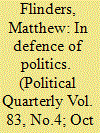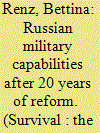|
|
|
Sort Order |
|
|
|
Items / Page
|
|
|
|
|
|
|
| Srl | Item |
| 1 |
ID:
177997


|
|
|
|
|
| Summary/Abstract |
We investigate external and domestic political influences on defence burden of the 28 EU member states, based on time-series cross-section data from 1993 to 2017. Our research is one of the most comprehensive studies on EU members' defence, as it includes many potential explanations. Our findings do not support freeriding by EU members, both NATO allies and non-NATO members, on US commitment in the defence and security field. Relatedly, NATO membership does not come up in the analysis as an instantaneous guarantee for an effective special relationship with the US. However, there is evidence of freeriding by EU members not belonging to the Alliance on EU-NATO member states. Domestic political factors are also important: right-wing parties in government are associated with heavier defence burden, while upcoming elections tend to reduce it. In general, we find that to provide an accurate explanation of military spending, one needs to take into account a multitude of different factors and, moreover, pay attention to conditional effects.
|
|
|
|
|
|
|
|
|
|
|
|
|
|
|
|
| 2 |
ID:
118212


|
|
|
| 3 |
ID:
130860


|
|
|
|
|
| Publication |
2014.
|
| Summary/Abstract |
Despite widespread perceptions, Russia is close to having the military it needs. In the aftermath of the Cold War, the leaders of the Russian Federation faced the unenviable task of creating national armed forces using what was left of the Soviet military. Plans to provide 'traditional' defence and to meet future challenges were considered as early as 1992, leading to a string of reform programmes over the next two decades. Such efforts were closely observed by analysts in the West and Russia, who documented the drawn-out process in a large body of literature. The assessments provided in the bulk of these works were almost unanimous: the reforms had failed, leaving the Russian armed forces 'impoverished, demoralized and largely ineffective', 'woefully inadequate to address the country's security threats' and standing 'perilously close to ruin'.
During the presidency of Boris Yeltsin, the reforms were seen as botched jobs that merely reduced troop numbers, essentially leaving Russia with a smaller version of a Soviet-style, mass-conscription army. The latest push for change, announced in the wake of the country's 2008 war with Georgia, during which the performance of the Russian military was widely criticised, met with a warmer reception, at least initially. It envisaged a comprehensive shift away from low-tech to high-tech; from conscription to professionalism; and from mass to mobility. Some structural changes, such as the transition from divisions to brigades and the streamlining of central command, were executed with impressive speed, raising expectations that Russia was finally on its way to acquiring a 'modern' military. As time went on, however, observers noted a range of problems that, in their eyes, dampened the prospect of ultimate success. The Russian defence industry remained unable to produce advanced equipment. The possibility of ending conscription and moving towards an all-volunteer force seemed to be as remote as ever. Moreover, the 2010 military doctrine continued to emphasise mobilisation, instead of focusing on permanent readiness and rapid reaction. When Defence Minister Anatoly Serdyukov was replaced by Sergei Shoigu - a long-standing ally of Russian President Vladimir Putin - in November 2012, some experts argued that the 2008 reforms were in effect 'dead'.
|
|
|
|
|
|
|
|
|
|
|
|
|
|
|
|
|
|
|
|
|